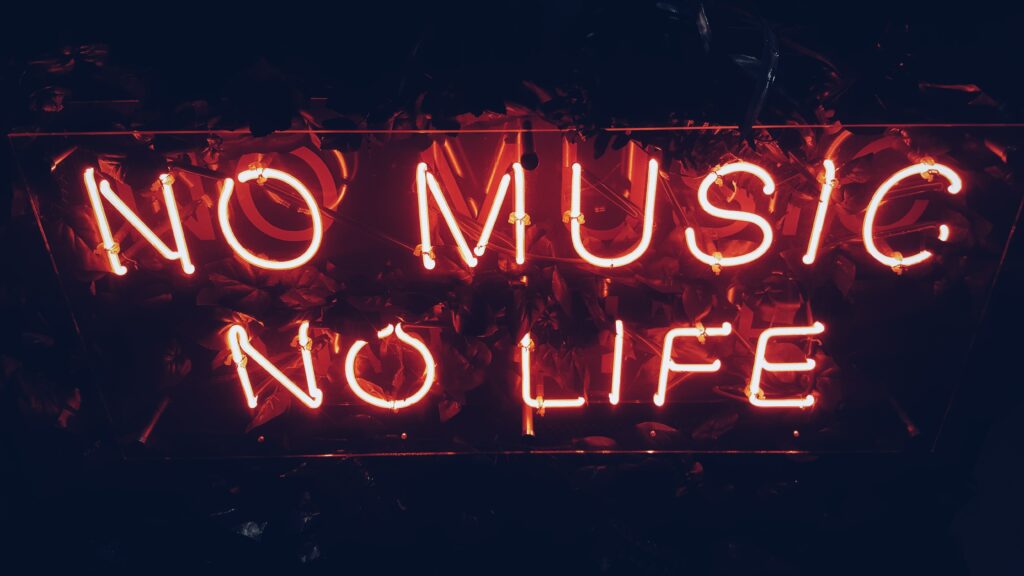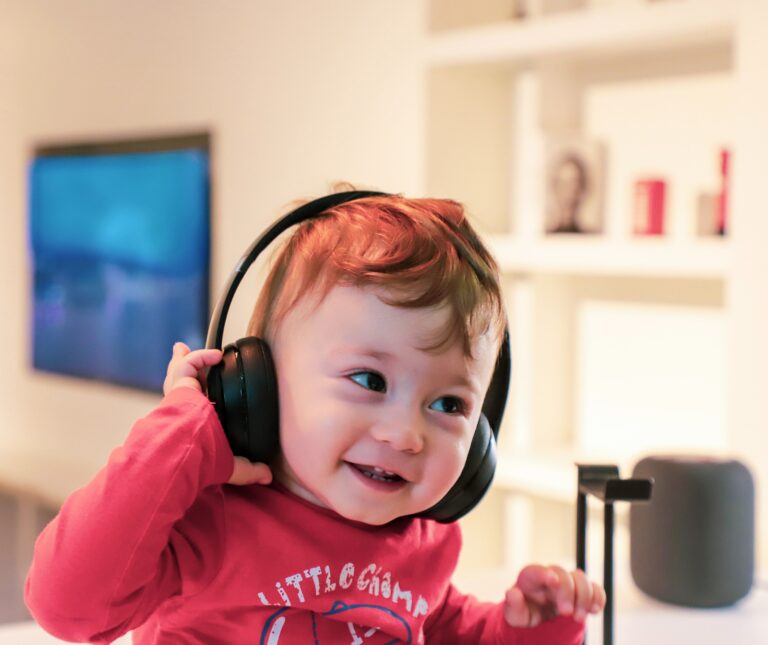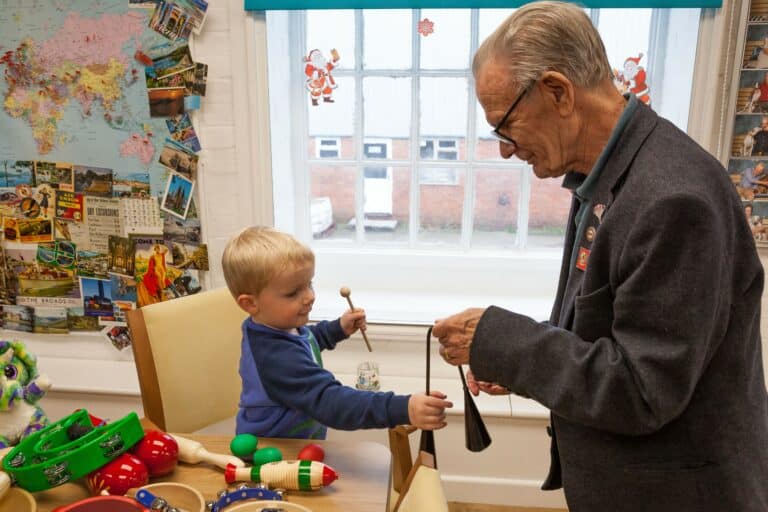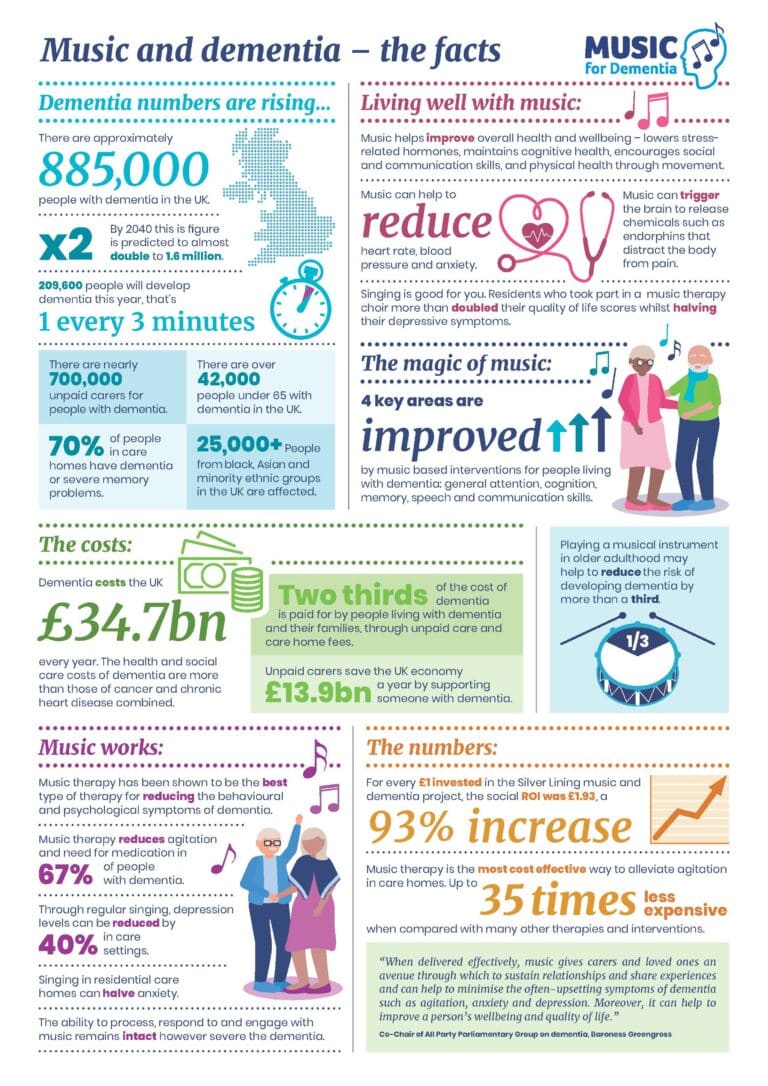A soundtrack to our lives
By George Lee •
Grace meadows, director of the music for dementia campaign talks about the importance of music across our whole life and how the new campaign is setting out to harness the power of music to improve the quality of life for those living with dementia.

Why is music important as we age?
Our ability to hear, process and respond to music stays with us into our final moments. This is because we are all musical beings. Our bodies are musical tools primed and ready to be set in motion – it’s all in there.
Music is hardwired into us while we are still in the womb, with our hearing mechanisms developing from around 18 weeks, enabling us to hear some noises and sounds. As our hearing mechanism develops, so too does our sense of hearing and processing as we listen to our mother’s heartbeat, their voice, the swishing and swirling of the amniotic fluid, and the strike of their footsteps. It’s thought that these maternal sounds help provide new-born babies prime their auditory skills to make the brain optimally ready for hearing and language development.
Our ability to respond to music stays with us until our final moments. It is the soundtrack to our lives – it’s our lives in music, and we all have our own personal soundtracks that we turn to for comfort, joy, motivation, release, contemplation, and inspiration. It also lives on beyond us. It creates lasting legacies which I’ve seen happen in music therapy sessions, where people have created musical gifts for their loved ones to remember them by and as a way to feel connected with them.
Music is play in sound. Play is integral in helping us understand the world around us, find meaning in experiences, express and expand our understanding of our experiences. Unicef describes play as ‘meaningful, joyful, iterative, actively engaging and socially interactive’ and I would say this also is true of music.

All of these elements, but particularly active engagement and social interaction are essential in helping not only to acquire but also maintain skills and supporting all-round health and wellbeing. Engaging in musical activities, particularly with others, helps to stave off social isolation and keeps us connected with ourselves, those around us and the communities we live in. We’ve seen just how powerfully music can do this during the pandemic.
In 2019, the World Health Organisation’s report on arts and health outlined the contribution of the arts, including music, to ‘the promotion of good health and the prevention on a range of mental and physical health conditions, as well as the treatment or management of acute and chronic conditions arising across the life-course’.
I also see engaging in music having another role and that is being able to see the person for who they are, beyond their age and any conditions they may be living with, such as dementia, and the possible associated co-morbidities.
Stigma around ageing and conditions such as dementia can further impact on health, wellbeing and quality of life in a variety of ways. However, when people are offered opportunities to engage in music and they are seen for who they are, a person’s potential comes to the fore. We see their potential, their abilities, rather than a disability or impairment. It also shakes off out-of-date notions that elders and / or those with conditions such as dementia are unable to try new things. Artists are constantly doing this throughout their lives.
Music isn’t a nicety, it’s a necessity. A necessity to support wellbeing across all aspects of our lives — Grace Meadows
Our ability to hear music is as an indicator of health
As we age so too do our senses, and each person’s ability to perceive and process sensory stimulation can be experienced differently. It also changes over time, affecting lifestyle. What was once enjoyable and pleasurable may no longer hold the same pleasure or bring the same joy. If, for example, hearing becomes impaired, this can cause confusion, loss of confidence and lead to a greater chance of experiencing social isolation.
In the same way new-born infants are primed for acquiring hearing and language through their auditory sense, music has a similar effect, in that it primes the brain for what might be coming next, helping us to predict, navigate and respond to the world around us.
Our ability to hear also help us to maintain our balance. This is why it is vital to have regular hearing tests, not only to ensure someone can hear and process the world around them, but also to support their social and physical health. There is also a growing body of research to suggest a link between hearing loss and dementia. Researchers are currently investigating this further and more information can be found here. If you notice your enjoyment of listening to music declining or that of someone else, talk to them about it because it may be an indicator that they are having issues with their hearing or there may be an underlying condition which needs investigating.
Passing on the baton
As we age, we accumulate experiences, knowledge, skills and we carry with us cultures, legacies and traditions from those who lived before us. Music is a beautiful channel through which the past can be shared with younger generations, and for keeping traditions, cultures and legacies alive. Think of how particular genres and styles of music have been passed down through the ages, often through elders who are respected and heralded as members of the community to be cherished for their knowledge and skills.
Music has no limits of a life-span — Nadine Gordimer
Today, we are seeing a blossoming of intergenerational music practice, with elders and children making music together as a way of bringing generations together to build healthier, happier, more creative and connected communities. This creates a myriad of benefits for elders and children alike, including improving sense of self, self-esteem, self-worth and increased community cohesion. Working intergenerationally is not new or innovative – as a species we have always done it – but it does start to re-address the balance around how much we value and respect our elders and the place and space we give them in society, to be contributors and not just recipients of care, ageism and / or stigma.

Researching the power of music
What we hear, see and feel music positively do for us and those around us is being better understood scientifically through research, particularly in the area of dementia. There was a significant leap in our understanding around music and the brain in the early nineties with the advent of brain imaging. Only then did we begin to grasp the extent of the brain’s involvement in how we process music, which is across the whole brain and not just in one region. This is why, when conditions such as dementia take effect, we are still able to engage in music, because there will be areas of the brain, unaffected by the disease, that will be able to continue processing music.
Whether it’s playing instruments to support brain health (as a 2014 study into twins investigated), music therapy reducing depression and improving quality of life in older adults with dementia, to demonstrating the effectiveness of music in comparison with other therapies, and music being the most cost effective method of dealing with agitation in care home settings compared to other interventions, the research is now validating what we all know in our bones, that music is good for us, especially those living with dementia. (For a full summary of research, visit our Research & Policy section).
If you are interested in being involved in music and dementia research, the international research study Homeside, is currently looking for people with dementia and family (or informal) caregivers to take part.
What this range of research shows is the breadth of ways in which music has the potential to positively impact on quality of life – individuals, families, communities, settings, systems and society as a whole. The ripple effects can be felt long after the music has stopped.
Having the scientific evidence base to support the real-world data, our lived experience of the power of music enables us to make the case more persuasively for music being embedded in dementia care.
Music is a beautiful channel through which the past can be shared with younger generations, and for keeping traditions, cultures and legacies alive — Grace Meadows
What was the inspiration for Music for Dementia? How did it start and what are your ambitions?
At the heart of Music for Dementia is a personal passion to harness the power of music to improve the quality of life for those living with dementia; of which it’s anticipated there will be 1.4m in the UK by 2025. Neil and Nicky Utley, founders of The Utley Foundation, which funds Music for Dementia, are passionate about music and making a positive impact with their philanthropy.
They, like so many, could see the powerful benefits of music, yet could not understand why it wasn’t readily available as a standard part of dementia care. What was also clear was the fragmentary nature of the music and dementia ecosystem and the need to bring people together. Establishing a Commission enabled the foundation to gain greater understanding around the current state of play whilst also bringing people together from across sectors. It also served to demonstrate the serious commitment being made by the foundation to work collaboratively and create a united voice around music and dementia.
The recommendations from the Commission were a clear call to action and we swiftly began responding to them, recruiting Lauren Laverne as our national ambassador to help lead the change we’re seeking to make.
We believe everyone living with dementia should have access to music as part of their care, from diagnosis to end of life, whatever their age, social or economic status. This is not currently the case. We want to make this happen on a national level, ensuring that:
- people with dementia have access to opportunities to appropriate music as an integral part of their care,
- carers feel empowered and enabled to make music a part of care,
- there is much greater awareness and understanding around the benefits of music for people living with dementia.
Music can’t cure dementia, but it can bring joy, provide comfort and enable people to continue to be contributors to their communities rather than just recipients of care. We all have the right to a quality of life, and for people living with dementia, we know music can be a powerful way of ensuring this is achieved.

Is the power of music being taken seriously enough? If not, why not, and what can be done to change this?
Music’s role to support health and wellbeing has come into sharp focus because of the pandemic, not least because of the moment of joy created by Paul and Nick Harvey captured in their viral video, which encapsulated and amplified the power of music perfectly.
We know that music can improve and enhance quality of life for all. We also know to reach everyone, we need a partnership that involves cross-sector engagement, from government to the care sector to the music industry. We need to join up the conversation around the power of music and its value to society, in all senses, to create a coherent, collaborative and collective approach in how we use it to benefit all.
Music for Dementia is currently leading this conversation in partnership with UK Music – you can find out more here.
Should we be looking at more ways to integrate music into our lives across our whole life course?
Simply put, yes! Music can improve and enhance quality of life for all. It was Pavarotti who said, “If children are not introduced to music at an early age, I believe something fundamental is being taken from them”, and I completely agree. Having worked as a music therapist with mums-to-be through to those at end of life, there is a role for music at every stage and every age in life, to enhance and enrich health, wellbeing, mental health, education and foster a flourishing cultural life – for individuals and society as a whole.
Music builds community and helps to build bonds, strengthening relationships with ourselves, each other and the world around us. Through music people can better cope with the daily stressors of life, resulting in them being able to help themselves achieve their own personal level of skills and abilities, and in doing so they can become more productive and contribute to their communities, at any age and with any condition.
We can each takes steps on an individual level to be incorporating music more actively in our lives, from listening to more music, learning an instrument, using it to help us process and manage feelings, as well as recognising its value to us as a whole. As a society, we need a culture change in our approach to music, ensuring access for all. Music isn’t a nicety, it’s a necessity. A necessity to support wellbeing across all aspects of our lives. To enable music to flow, we need to truly value it beyond the economic benefits it brings to the UK, and place it at the heart of our education, health and social care systems. The first steps are helping people to understand and see, hear and feel the power of music in action.
Tell us more about the campaign. How can people get involved?
You can find out more about the campaign at www.musicfordementia.org.uk, where you can
- sign up as a supporter or become a champion
- use our resources to help you to incorporate music into the care you provide
- use our radio stream via www.m4dradio.com
- share your stories – we would love to hear about how you are using music to stimulate sense to enhance and enrich care.

More Information
Music for Dementia and The Utley Foundation
Music for Dementia, funded by The Utley Foundation, campaigns for people with dementia to have music as an integral part of their care whatever their circumstances. We are calling on the music industry, philanthropists, and the health and social care sectors to help make this possible. The Utley Foundation was founded in 2014 by Neil and Nicky Utley. The Foundation exists to advance social causes and to act as a catalyst for greater funding and wider action for the causes it supports. Music is a personal passion of the founders and trustees and underpins many of the key funding areas of interest to the foundation. The trust has other charitable objectives including Armed Forces Veterans, Children and Overseas Aid.
Grace Meadows
Director of the Music for Dementia campaign, Grace has a life-long career in music, having initially trained as a professional bassoonist. For the last decade she has worked as a qualified music therapist in a variety of health, social care and educational settings with children and adults across the lifespan.
Her early campaign experience was developed at the Music Manifesto, and Sing Up, the national programme to reinstate singing in primary schools. A passionate voice for the power and value of music, Grace later worked for the British Association for Music Therapy, advocating for the inclusion of music and music therapy across health, social care and educational systems.
Grace is passionate about the value of music, the arts more broadly and culture to enhance and enrich lives, and the power of people and collaboration to create transformative impact and change.